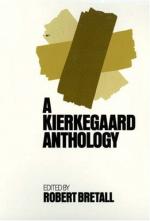
|
| Name: _________________________ | Period: ___________________ |
This test consists of 15 multiple choice questions and 5 short answer questions.
Multiple Choice Questions
1. What does Robert Bretall think of Repetition?
(a) It is a humorist's piece.
(b) It is Kierkegaard's best work of literature.
(c) It is one of the worse works by Kierkegaard.
(d) It is full of holes in logic.
2. Who does Kierkegaard think is the most likely person to understand the ideas in Fear and Trembling?
(a) Regina.
(b) A theologian.
(c) Himself.
(d) A priest.
3. Where does the idea of Repetition derive from?
(a) Kierkegaard's own life.
(b) Regina's life.
(c) The life of Christ.
(d) The rise of Christian dogma.
4. What is Kierkegaard stunned by in The Journals?
(a) The power of God.
(b) His own nothingness.
(c) His own feeling.
(d) The feelings of Chris.
5. What does Robert Bretall say Kierkegaard is in the Two Edifying Discourses?
(a) A poet.
(b) A theopolian.
(c) A liar.
(d) A fiction writer.
6. What is Kierkegaard aware of in The Journals?
(a) His nothingness.
(b) His errors.
(c) His self interest.
(d) His longing for Regina.
7. What does Kierkegaard say forms Repetition?
(a) Man.
(b) The idea of repetition.
(c) Christ.
(d) The idea of abundance.
8. What does the first piece of Stages on Life's Way cover?
(a) Trust in the state Church.
(b) Love and aesthetic.
(c) Love in Christ.
(d) The role of Bishops.
9. What does Repetition have that lacks in many of Kierkegaard's works?
(a) A plot.
(b) A third person point of view.
(c) Chapters.
(d) Humor.
10. What does Kierkegaard think what his family receives is?
(a) A good omen.
(b) Money.
(c) Bad luck.
(d) A punishment.
11. What does the meditation in Fear and Trembling illustrate?
(a) Kierkegaard's regrets.
(b) Kierkegaard's love for mistery.
(c) Kierkegaard's love for Regina.
(d) Kierkegaard's happiness.
12. What do The Journals say Kierkegaard feels?
(a) Happy.
(b) In love.
(c) Sad.
(d) Torn.
13. What does Kierkegaard believe lies at the center of Christianity?
(a) Christ.
(b) Truth.
(c) A cross.
(d) A religiosity of paradoxes.
14. What does Kierkegaard argue major choices in life are choices of?
(a) Character.
(b) Intellect.
(c) God.
(d) Christ.
15. What does Kierkegaard ask but does not give answers to in the Fragments?
(a) Who am I?
(b) Does Christ love us when we don't love him?
(c) The questions crucial to Christianity to survive modernity.
(d) Will society resist modernity out of love of Christ?
Short Answer Questions
1. Which of the Two Edifying Discourses does Kierkegaard prefer?
2. What topic does Either/Or end with?
3. Who is Regina Olsen?
4. What pseudonym does Kierkegaard use to publish Either/Or?
5. What is the author arguing is more important than the content of Either/Or?
|
This section contains 417 words (approx. 2 pages at 300 words per page) |

|




